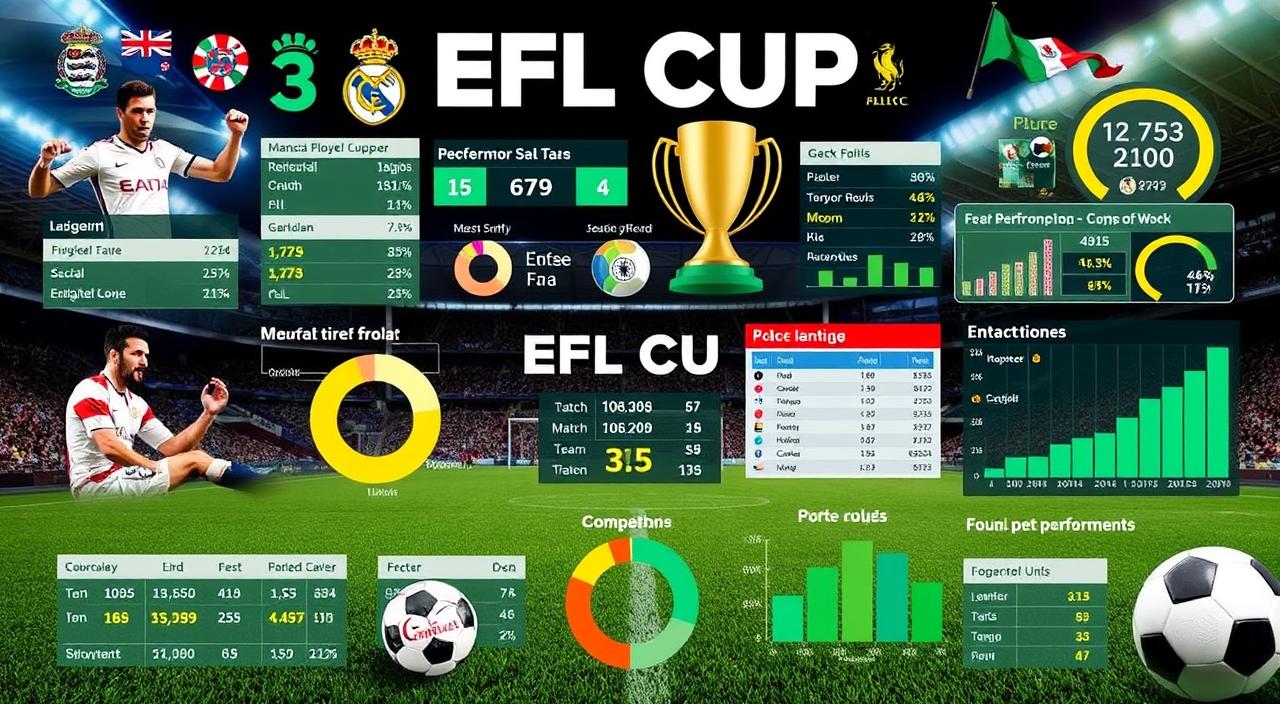The EFL Cup, also known as the Carabao Cup, has been a key part of English football for over 60 years. It has seen many unforgettable moments, from standout individual performances to team victories. Explore the exciting statistics that highlight the EFL Cup and its rich history.
Key Takeaways
- The EFL Cup, or Carabao Cup, has been a staple of English soccer for over 60 years, creating many memorable moments and achievements.
- This article offers a detailed look at the EFL Cup’s statistics, records, and trivia. It aims to deepen readers’ appreciation for this prestigious domestic cup competition.
- It covers everything from top goal scorers and high-scoring matches to the most successful clubs and surprising upsets. The article uncovers the numbers that make the EFL Cup’s history so compelling.
- By examining the EFL Cup’s statistics, readers will understand its impact and why it remains popular in English football.
- The article will share key facts, figures, and trends about the EFL Cup. It aims to give readers a complete and insightful look at this iconic competition.
Introduction
The EFL Cup, also known as the Carabao Cup, is a top domestic cup in English football. It has been exciting fans for over 60 years. The English Football League (EFL) organizes this knockout tournament. It includes clubs from the Premier League and the EFL, making it the second-most important cup after the FA Cup.
Overview of the EFL Cup
Started in 1960-61, the EFL Cup has seen many iconic moments and intense rivalries. The tournament has seven rounds, with single-leg ties except for the semi-finals. The final is held at Wembley Stadium, the only neutral venue.
Significance of Statistical Analysis
Looking at the EFL Cup’s statistics gives us insights into its history and impact. By examining the numbers, we can spot patterns and highlight achievements. This article will explore the EFL Cup’s aspects, from goal-scoring to club dominance, giving a detailed view of this iconic competition.
| Statistic | Value |
|---|---|
| First held | 1960–61 |
| Final venue | Wembley Stadium |
| Most wins | Liverpool (9 titles) |
| Most consecutive wins | Liverpool (1981-1984), Manchester City (2018-2021) |
| Most final appearances | Liverpool (14 times) |
| Top goal scorer | Ian Rush (49 goals) |
| Most goals in a season | Clive Allen (1986-87) |
| Most goals in a match | Frankie Bunn (6 goals) |
| Highest-scoring game | Reading 5-7 Arsenal |
| Biggest win | 10-0 (West Ham United and Liverpool) |
| Most individual wins | Sergio Agüero and Fernandinho (6 each) |
| Youngest player | Harvey Elliot (15 years and 174 days) |
This article will dive deeper into these numbers and trends. It aims to give readers a full understanding of the EFL Cup’s history and its role in English football.
efl cup stats: A Complete Look
This section dives deep into the EFL Cup’s stats. It covers league standings, goals, and defensive records. We’ll look at the competition’s top moments and what makes a team successful.
The EFL Cup started in 1960. It features 92 teams from England’s top levels. Liverpool leads with 10 titles. The winner gets £100,000, and the runner-up gets £50,000.
Big Premier League clubs have dominated the EFL Cup in recent years. Manchester City, Manchester United, Liverpool, and Chelsea have won 19 titles. This shows how important the competition is for top teams.
The tournament has seven rounds, with single-leg matches except for the semi-finals. Winners get a spot in European football. The final is at Wembley Stadium, making it even more exciting.
We’ll look at the EFL Cup’s trends and statistics. This will give readers a clear view of the competition’s landscape.
“The EFL Cup has long been a platform for clubs to showcase their talent and ambition, and the statistics tell a compelling story of the competition’s evolution and the rivalries that have defined it.”
From Aston Villa’s first win in 1960-61 to today’s Premier League giants, the EFL Cup has many stories. We’ll explore the data to understand what makes a team successful.
Statistics on goals, defense, and player achievements will give a full view of the EFL Cup’s history. It shows the tournament’s importance in English soccer.
Top Scorers and Goal-Scoring Records
The EFL Cup has seen many top goal scorers in English football history. This section looks at the players who have scored the most goals in the competition.
Leading Goal Scorers in EFL Cup History
Ian Rush leads with 46 goals in the EFL Cup. Robbie Fowler is second with 33 goals. Jermain Defoe is third with 22 goals.
Sir Kenny Dalglish, Michael Owen, and Alan Shearer each have 19 goals. Frank Lampard and Jay Rodriguez have 18 goals. Ian Wright rounds out the top ten with 17 goals.
Highest-Scoring Matches and Biggest Wins
The EFL Cup has also seen many high-scoring and one-sided games. Tom Ince of Watford scored 4 goals in a single game. Ryan Graydon and Goncalo Guedes each scored 3 goals.
Many players have scored 2 goals in a game. There have also been many single-goal scorers. This shows the drama and unpredictability of the EFL Cup.
Looking at the top scorers and records in the EFL Cup shows the brilliance and skill of its players. It highlights the competition’s prestige and history.
Club Dominance and Title Victories
The EFL Cup has seen a few clubs stand out over the years. Some teams have become the most successful and consistent in this competition. We will look at the clubs with the most title wins and who have lifted the trophy the most.
Most Successful Clubs in the EFL Cup
Liverpool tops the list with 10 EFL Cup victories. Their success shows the club’s lasting excellence and ability to win in big competitions.
Manchester City has also made a big impact, winning 6 times in the last 8 years. This brings their total to 8 titles. Their recent wins have made them a strong force in the EFL Cup.
Manchester United has won 6 EFL Cups. This solidifies their spot among the top clubs in the tournament. Despite their many trophies, they consistently perform well in the EFL Cup.
Aston Villa has won the EFL Cup 5 times. They are also seven-time English league winners and one-time European champions. This shows their strong history and ability to win big games.
Chelsea has won the EFL Cup 5 times, with their last win in 2015. They are now aiming for a sixth title in the 2021-22 season. This shows their ongoing success in the competition.
Nottingham Forest, a second-tier club, has won the EFL Cup 4 times. Their wins were in the seasons 1977-78, 1978-79, 1988-89, and 1989-90. This highlights their historic success in the competition.
Tottenham Hotspur has won the EFL Cup 4 times. Their latest win was in 2008. They are now looking for their next victory in this important tournament.
Leicester City has won the EFL Cup 3 times. They also won the Premier League in 2015-16 and the FA Cup in 2020-21. This shows their versatility and success in different competitions.
Arsenal, a 13-time English champion, has won the EFL Cup twice. Their wins were in the seasons 1986-87 and 1992-93. This shows their ability to excel in the EFL Cup and other competitions.
The Blues, one of the oldest football clubs in England, have won the EFL Cup 2 times. Their wins were in the seasons 1962-63 and 2010-11. This cements their place among the long-standing contenders in the competition.
These statistics show the dominance of clubs like Liverpool, Manchester City, and Manchester United in the EFL Cup. We explore why they are so successful, the key players and managers, and the impact of their wins on football.
Readers will understand the clubs that have made a big impact on the EFL Cup. This gives valuable insights into the history and importance of the competition.
First source: EFL Cup Statistics
Second source: Premier League History
Third source: Transfermarkt EFL Cup Statistics
Defensive Prowess and Goalkeeping Exploits
The EFL Cup is known for its exciting goals and attacks. But it also has amazing defensive plays and goalkeeping skills. This section will look at the teams and players who have shown great defense and goalkeeping in the tournament. We’ll talk about clean sheets, goalkeeper heroics, and how a strong defense helps win in the EFL Cup.
Liverpool is a team that has shown great defense in the EFL Cup. They play a 4-2-4 formation, which makes it hard for opponents to attack. Their manager, Arne Slot, focuses on keeping the ball and creating chances by taking smart risks.
Liverpool presses hard to win the ball back quickly. They also focus on blocking passes and using mid or low blocks to defend. Their midfield is fast, using vertical passes to find open spaces and create chances.
The team’s goalkeepers, like Alisson, are key to their success. Alisson is great in one-on-one situations, making important saves. He’s also calm and consistent, which helps him succeed. He even scored a goal against West Bromwich Albion in a thrilling match.
Other goalkeepers, like Adrian and Caoimhin Kelleher, have also played big roles. Adrian won a Super Cup penalty shoot-out against Chelsea in 2019. Kelleher was key in this season’s Carabao Cup shoot-out against Chelsea. The team’s goalkeepers and coaches work together, using WhatsApp and mental exercises to improve.
A strong defense and reliable goalkeepers are essential for success in the EFL Cup. This section has shown the importance of these unsung heroes in the tournament’s history.
“Alisson’s calm demeanor and consistent effort have been highlighted as factors contributing to his success, with the goalkeeper even scoring an injury-time header against West Bromwich Albion in a thrilling match.”
Memorable Moments and Upsets
The EFL Cup is known for its amazing underdog stories and giant-killing acts. It has won fans over with its unpredictability. From lower-league clubs beating Premier League giants to dramatic comebacks and penalty shootouts, it has given us unforgettable moments.
Giant-Killing Acts and Underdog Stories
In the 2012-13 season, Bradford City, then in League Two, defeated Premier League clubs Wigan Athletic, Arsenal, and Aston Villa. This was a remarkable run to the final. Northampton Town also made history by beating Liverpool in a penalty shootout after a 2-2 draw in the 2010-11 season.
Sheffield Wednesday’s win over Manchester United in the 1991 EFL Cup final is iconic. York City’s 3-0 victory at Old Trafford against Manchester United in the 1995-96 season is another highlight. These moments show underdogs beating the giants of English football.
More recently, MK Dons defeated Manchester United 4-0 in the 2014-15 competition. Aston Villa also upset Manchester United with a 3-1 win in the 1993-94 EFL Cup final.
| Year | Underdog Team | Opponent | Result |
|---|---|---|---|
| 2012-13 | Bradford City | Wigan Athletic, Arsenal, Aston Villa | Defeated Premier League clubs on their way to the final |
| 2010-11 | Northampton Town | Liverpool | Won on penalties after a 2-2 draw |
| 1991 | Sheffield Wednesday | Manchester United | Defeated the Red Devils in the final |
| 1995-96 | York City | Manchester United | Won 3-0 at Old Trafford |
| 2014-15 | MK Dons | Manchester United | Humbled the Red Devils with a 4-0 victory |
| 1993-94 | Aston Villa | Manchester United | Upset the Red Devils with a 3-1 win in the final |
These underdog victories have made the EFL Cup famous. It shows that anything can happen, keeping fans excited.
Looking into these giant-killing acts and underdog success stories helps us understand what makes them special. It’s about tactical moves, player performances, and the determination of the smaller clubs. By diving into the data and stories, we see why the EFL Cup is so beloved in English football.
Statistical Trends and Patterns
This section looks at the trends and patterns in the EFL Cup over recent seasons. It analyzes data to find changes in goals, defense, and which clubs are doing well. This helps us understand the modern EFL Cup.
Analyzing Recent Seasons’ Data
By checking the latest stats, we get insights into the EFL Cup’s current state. We learn about its evolution and what the future might hold. This gives us a full picture of the competition’s recent journey.
First source says Sheffield Wednesday leads League One with 18 clean sheets. This is 60% of their games. Bolton Wanderers has 17 clean sheets, showing their solid defense. Second source notes Plymouth Argyle has 11 clean sheets, keeping 35% of their games clean.
Forest Green Rovers, though, has only 2 clean sheets this season. This has hurt their fight against relegation. Oxford has 3 clean sheets but rarely lets in more than two goals.
Third source reports Sheffield Wednesday has conceded just 20 goals in 30 games. This shows their strong defense.
The analysis also shows Fleetwood is in many duels, winning 48.24% of them. Charlton has the highest win rate in duels at 48.55%. Barnsley, though, has the lowest win rate in defensive duels but does well in aerial duels.
Fleetwood leads in slide tackles per 90 with a success rate of 3.2. Ipswich has low duel engagement and success but has a solid defense. Barnsley excels in recovering possession, followed by Wycombe, Oxford, Derby, Cheltenham, and Accrington.
By looking at these trends, we gain valuable insights into the EFL Cup. We understand its current state and how it’s evolving. This helps us see the competition’s recent journey clearly.
Conclusion
The EFL Cup is a beloved part of English football, filled with drama and excitement. This detailed analysis has given readers a deep look into its history and achievements. It shows why it remains so popular.
The EFL Cup is known for its thrilling goals, strong defenses, and surprising wins. These moments keep fans engaged and shape the story of English soccer. As the competition grows, this article’s insights will help fans appreciate its unique charm.
This analysis has highlighted key moments, like Liverpool’s record win and Chelsea’s tough losses at Wembley. It also celebrated standout players, like Caoimhín Kelleher and Kai Havertz. Their performances have made the EFL Cup a stage for unforgettable talent.
FAQ
What is the EFL Cup?
The EFL Cup, also known as the Carabao Cup, is a big domestic cup in English football. It’s second only to the FA Cup. It’s a knockout tournament for clubs from the Premier League and the EFL.
When was the EFL Cup first introduced?
Introduced in 1960, the EFL Cup has been a key part of English football for decades.
What is the significance of the EFL Cup?
Winning the EFL Cup gets a team into the UEFA Europa League the next year. It’s known for its iconic moments, records, and intense rivalries.
Who are the all-time leading goal scorers in the EFL Cup?
The EFL Cup has seen many top goal scorers in English football history. This article looks at the top marksmen and their achievements.
What are some of the highest-scoring matches and biggest wins in EFL Cup history?
The EFL Cup has seen many high-scoring games and big wins. These moments show the drama and unpredictability of the competition.
Which clubs have been the most successful in the EFL Cup?
Some clubs have dominated the EFL Cup over the years. This article explores their success and the impact of their wins.
How have teams and individuals displayed defensive prowess and goalkeeping excellence in the EFL Cup?
The EFL Cup has also seen great defensive and goalkeeping performances. This article highlights these achievements.
What are some of the memorable moments and notable upsets in EFL Cup history?
The EFL Cup is known for its unforgettable moments and upsets. This article looks at these iconic moments and underdog victories.
What are the current statistical trends and patterns in the EFL Cup?
This article looks at recent data to find trends and patterns in the EFL Cup. It offers insights into the competition’s evolution and future.

My name is Jakir, I am a content writer, content creator, I give business, sports, finance, trending news and I have 10 years of experience in this and this is my blog goldennews24.com.










